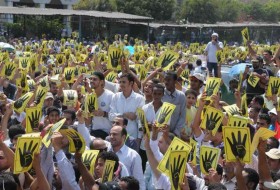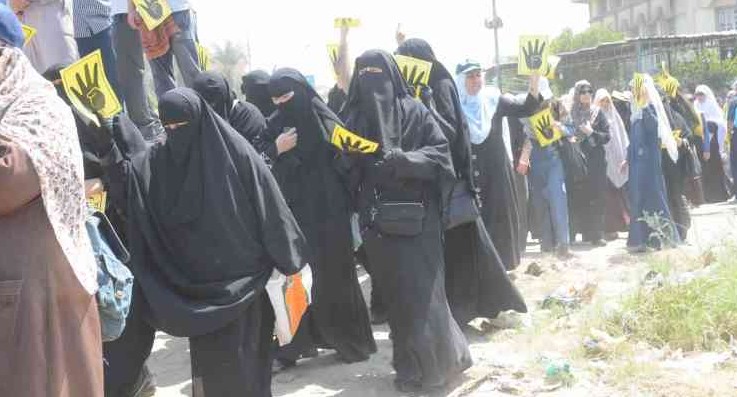 No one will say how many have died. No one will reveal how many are in prison. There is no agreement even on how many demonstrators turned out Friday for the latest protest against last month’s coup, in an atmosphere fraught with competing figures and misinformation. A crackdown by Egypt’s new military-backed government has decapitated the Muslim Brotherhood, the powerful Islamist organization that ran this country for just over a year. As the police state is resurrected, authorities are walling off information on the number of deaths and detentions, and seeking to minimize what remains of the group’s support. Supporters of Egypt’s ousted President Mohammed Morsi, run for cover from tear gas fired by police, not seen, during a protest in Cairo, Egypt, Friday, Aug. 30, 2013. Tens of thousands of protesters and Muslim Brotherhood supporters rallied Friday throughout Egypt against a military coup and a bloody security crackdown, though tanks and armored police vehicles barred them from converging in major squares. People raise their hands and banners to show a hand gesture of an open palm with four raised fingers during a protest in Beni Sueif, south of Cairo, Egypt, Friday, Aug. 30, 2013. The gesture became a symbol for the main sit-in of supporters of Egypt’s ousted President Mohammed Morsi near the Rabaah al-Adawiya mosque in Cairo. The sit-in was violently disbanded. Several thousand people heeded calls by the Muslim Brotherhood and protested Friday throughout Cairo and other cities against a coup and deadly crackdown as the police and army blocked key roads and beefed up security. The Arbaic on the banners reads, Supporters of Egypt’s ousted President Mohammed Morsi, chant slogans during a protest in Cairo, Egypt, Friday, Aug. 30, 2013. Tens of thousands of protesters and Muslim Brotherhood supporters rallied Friday throughout Egypt against a military coup and a bloody security crackdown, though tanks and armored police vehicles barred them from converging in major squares. On Friday, thousands took to the streets across the nation in thinning marches in support of the ousted president, Mohammed Morsi. Egypt’s Ministry of Health reported that six people were killed and more than a dozen injured when clashes erupted between protesters and civilian opponents in some areas, and marchers and police in others. Security forces fired tear gas and sporadic gunfire at protesters in central Cairo. But, in a sign of how state and private media have played down any support for Morsi, Egyptian television networks mostly broadcast scenes of empty streets and quiet squares. The Muslim Brotherhood said one demonstrator was killed by police. After weeks of protests against the coup, the government launched a full-fledged crackdown on August 14, starting with raids on two pro-Morsi sit-ins that left hundreds of civilians dead. Security officials have arrested Muslim Brotherhood members every day since then, including the group’s most prominent official still at liberty – Mohamed Beltagi – on Thursday. But the state has released only partial figures of arrests. Egypt’s Ministry of Health stopped publishing a total casualty count from the crackdown on August 17 “because of the huge number of deaths,” according to one ministry official, who spoke on the condition of anonymity because he was not authorized to speak to the media. At that point, more than 900 people had been killed in four days, according to the official tally. When Egyptians are arrested, they typically face a hearing before a prosecutor within 48 hours to learn whether they will be detained pending possible trial, said Diana Eltahawy, an Egypt researcher for Amnesty International. Normally lawyers are allowed access to prosecutors’ offices. But since the coup, the hearings for alleged Morsi supporters “are taking place inside the places of detention – police stations and prisons,” as well as in riot police camps, Eltahawy said – and the numbers simply aren’t getting out. Eltahawysaid the number of detained has probably surpassed 1,000. Another activist, Ahmed Mehrif, who directs a Switzerland-based Arab rights group, put the number closer to 2,000. And a Western diplomat, who spoke on the usual condition of anonymity, said it could range from 3,000 to 8,000, most of them “rank and file” members of the Muslim Brotherhood, or Morsi supporters unaffiliated with the Islamist group.
No one will say how many have died. No one will reveal how many are in prison. There is no agreement even on how many demonstrators turned out Friday for the latest protest against last month’s coup, in an atmosphere fraught with competing figures and misinformation. A crackdown by Egypt’s new military-backed government has decapitated the Muslim Brotherhood, the powerful Islamist organization that ran this country for just over a year. As the police state is resurrected, authorities are walling off information on the number of deaths and detentions, and seeking to minimize what remains of the group’s support. Supporters of Egypt’s ousted President Mohammed Morsi, run for cover from tear gas fired by police, not seen, during a protest in Cairo, Egypt, Friday, Aug. 30, 2013. Tens of thousands of protesters and Muslim Brotherhood supporters rallied Friday throughout Egypt against a military coup and a bloody security crackdown, though tanks and armored police vehicles barred them from converging in major squares. People raise their hands and banners to show a hand gesture of an open palm with four raised fingers during a protest in Beni Sueif, south of Cairo, Egypt, Friday, Aug. 30, 2013. The gesture became a symbol for the main sit-in of supporters of Egypt’s ousted President Mohammed Morsi near the Rabaah al-Adawiya mosque in Cairo. The sit-in was violently disbanded. Several thousand people heeded calls by the Muslim Brotherhood and protested Friday throughout Cairo and other cities against a coup and deadly crackdown as the police and army blocked key roads and beefed up security. The Arbaic on the banners reads, Supporters of Egypt’s ousted President Mohammed Morsi, chant slogans during a protest in Cairo, Egypt, Friday, Aug. 30, 2013. Tens of thousands of protesters and Muslim Brotherhood supporters rallied Friday throughout Egypt against a military coup and a bloody security crackdown, though tanks and armored police vehicles barred them from converging in major squares. On Friday, thousands took to the streets across the nation in thinning marches in support of the ousted president, Mohammed Morsi. Egypt’s Ministry of Health reported that six people were killed and more than a dozen injured when clashes erupted between protesters and civilian opponents in some areas, and marchers and police in others. Security forces fired tear gas and sporadic gunfire at protesters in central Cairo. But, in a sign of how state and private media have played down any support for Morsi, Egyptian television networks mostly broadcast scenes of empty streets and quiet squares. The Muslim Brotherhood said one demonstrator was killed by police. After weeks of protests against the coup, the government launched a full-fledged crackdown on August 14, starting with raids on two pro-Morsi sit-ins that left hundreds of civilians dead. Security officials have arrested Muslim Brotherhood members every day since then, including the group’s most prominent official still at liberty – Mohamed Beltagi – on Thursday. But the state has released only partial figures of arrests. Egypt’s Ministry of Health stopped publishing a total casualty count from the crackdown on August 17 “because of the huge number of deaths,” according to one ministry official, who spoke on the condition of anonymity because he was not authorized to speak to the media. At that point, more than 900 people had been killed in four days, according to the official tally. When Egyptians are arrested, they typically face a hearing before a prosecutor within 48 hours to learn whether they will be detained pending possible trial, said Diana Eltahawy, an Egypt researcher for Amnesty International. Normally lawyers are allowed access to prosecutors’ offices. But since the coup, the hearings for alleged Morsi supporters “are taking place inside the places of detention – police stations and prisons,” as well as in riot police camps, Eltahawy said – and the numbers simply aren’t getting out. Eltahawysaid the number of detained has probably surpassed 1,000. Another activist, Ahmed Mehrif, who directs a Switzerland-based Arab rights group, put the number closer to 2,000. And a Western diplomat, who spoke on the usual condition of anonymity, said it could range from 3,000 to 8,000, most of them “rank and file” members of the Muslim Brotherhood, or Morsi supporters unaffiliated with the Islamist group.

Aug312013
